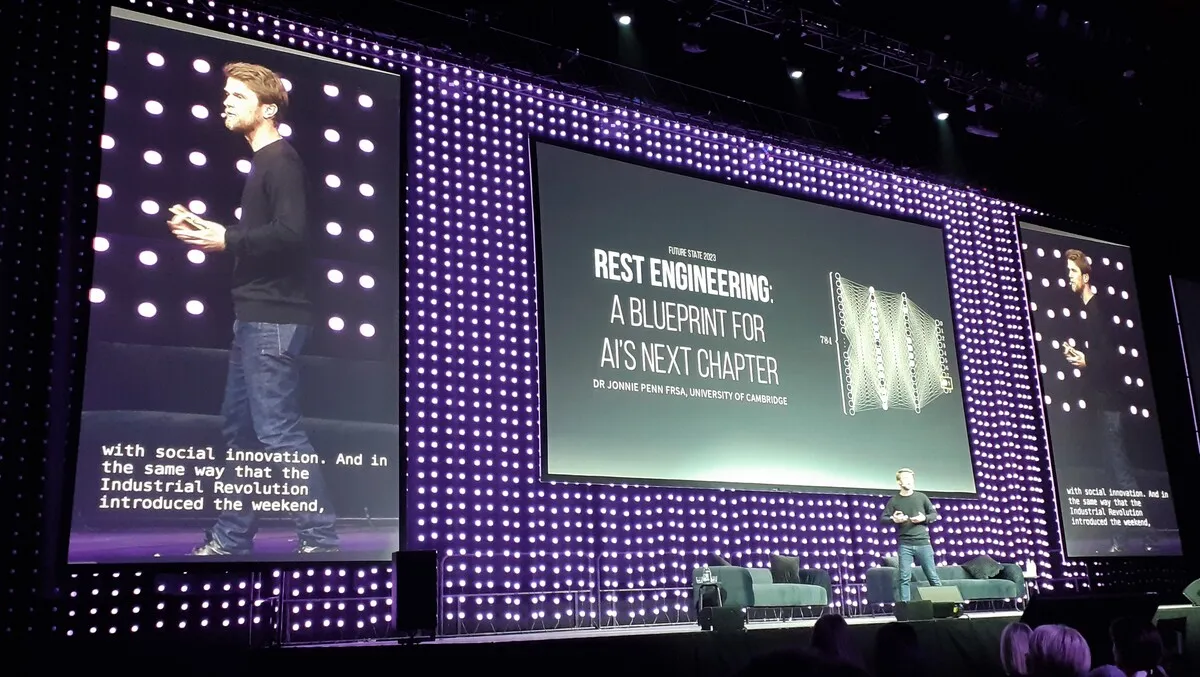
Inaugural NZ tech event addresses our digital future
Spark Business Labs held Future State 2023 yesterday at Auckland's Spark Arena, inviting a range of business and thought leaders to discuss the future of work.
The first event of its kind, Future State included keynotes addressing issues such as data sovereignty, the metaverse, AI, UI and UX, among many others.
Jack Tame and Dr Michelle Dickinson hosted the event, bringing warmth and humour that helped to keep the audience attentive and upbeat between keynotes, many of which discussed very serious challenges that we, as a society, are facing.
Tame began by acknowledging the dramatic impact of the latest technologies on the economy.
Offering encouragement to the approximately 200+ attendees (a broad mix of business leaders, C-suite executives, media, advertisers and marketers, and high school students), Tame said preparation was a key motivator for holding the event.
"Think about the ways New Zealand businesses can prepare for the fourth industrial revolution," Tame said.
Matt Bain, Marketing Director of Spark, was next to speak, noting that technology has far-reaching implications for businesses and consumers in addressing issues ranging from sustainability to ways of working.
"New Zealand businesses need access to the latest tools and technologies," Bain said of the reasoning behind the event.
He added that the focus is on how we make positive use of these new technologies, acknowledging that after a period of remote work during the pandemic, now is the time to pull together to explore and unpack these new capabilities and the possibilities they hold.
Bain said Future State 2023 was about building mental and creative resilience for attendees and their wider businesses and instilling renewed optimism about the path forward.
Dr Jonnie Penn, a professor of AI Ethics and Society at the University of Cambridge, presented a keynote discussing a term he advocates for: "Rest engineering".
The keynote, subtitled "A Blueprint for AI's Next Chapter", delved into the sudden rise of ChatGPT and Large Language Models.
Dr Penn examined the challenges and opportunities now available and the moral dilemmas that come with creating such technologies, specifically, what place humans have in the working world.
He described the notion of rest engineering as being like music, where you have notes, and you have rests.
Dr Penn said the rests are important because they give poignancy to the notes, and when it comes to tech, the society we live in currently is too focused on going bigger with everything.
He said part of this mindset is also considering where we don't need AI just as much as where we do.
"You have to choose to rest. We go mad with [technology], maximising it everywhere," Dr Penn said.
"There are things we can learn from rest rather than running.
"If we want these tools to be a sustainable part of the cultures we live in, we need to identify what is helpful and what is not."
Dr Penn ultimately posed the biggest question of the day: "How much digital is enough?"
But he also reminded attendees that we can be reassured in times like these, as "there are counter cultural responses to changes."
"These technologies remind us that we have more in common than not," Dr Penn said.
His advice for New Zealand businesses was to start small and take proactive steps such as following people on Twitter who are interested in the topic and, most importantly, writing a "decomputerisation" statement.
"What is the part of your business that can't be digitised? Use it as a value proposition," Dr Penn said.


